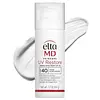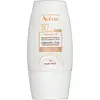What's inside
What's inside
 Key Ingredients
Key Ingredients

 Benefits
Benefits

 Concerns
Concerns

 Ingredients Side-by-side
Ingredients Side-by-side

Zinc Oxide 15%
Cosmetic ColorantCoco-Caprylate/Caprate
EmollientButyloctyl Salicylate
Skin ConditioningCaprylic/Capric Triglyceride
MaskingOctyldodecyl Neopentanoate
EmollientMethyl Glucose Sesquistearate
EmollientSilica
AbrasiveGlyceryl Stearate
EmollientPEG-100 Stearate
PEG-20 Methyl Glucose Sesquistearate
EmulsifyingPhenoxyethanol
PreservativeTriethoxycaprylylsilane
Polyhydroxystearic Acid
EmulsifyingGlycerin
HumectantGlyceryl Behenate
EmollientSaccharide Isomerate
HumectantXanthan Gum
EmulsifyingZingiber Officinale Root Extract
MaskingHydroxyethyl Acrylate/Sodium Acryloyldimethyl Taurate Copolymer
Emulsion StabilisingSqualane
EmollientEthylhexylglycerin
Skin ConditioningTetrahexyldecyl Ascorbate
AntioxidantTocopheryl Acetate
AntioxidantSclerotium Gum
Emulsion StabilisingLecithin
EmollientPullulan
Dimethicone
EmollientMica
Cosmetic ColorantPolysorbate 60
EmulsifyingEthylene/Methacrylate Copolymer
Zinc Oxide 15%, Coco-Caprylate/Caprate, Butyloctyl Salicylate, Caprylic/Capric Triglyceride, Octyldodecyl Neopentanoate, Methyl Glucose Sesquistearate, Silica, Glyceryl Stearate, PEG-100 Stearate, PEG-20 Methyl Glucose Sesquistearate, Phenoxyethanol, Triethoxycaprylylsilane, Polyhydroxystearic Acid, Glycerin, Glyceryl Behenate, Saccharide Isomerate, Xanthan Gum, Zingiber Officinale Root Extract, Hydroxyethyl Acrylate/Sodium Acryloyldimethyl Taurate Copolymer, Squalane, Ethylhexylglycerin, Tetrahexyldecyl Ascorbate, Tocopheryl Acetate, Sclerotium Gum, Lecithin, Pullulan, Dimethicone, Mica, Polysorbate 60, Ethylene/Methacrylate Copolymer
Zinc Oxide 12%
Cosmetic ColorantWater
Skin ConditioningC12-15 Alkyl Benzoate
AntimicrobialCaprylic/Capric Triglyceride
MaskingPropanediol
SolventJojoba Esters
EmollientTridecyl Salicylate
Skin ConditioningMethylheptyl Isostearate
Skin ConditioningPolyglyceryl-4 Diisostearate/Polyhydroxystearate/Sebacate
EmulsifyingNiacinamide
SmoothingNylon-12
Methylpropanediol
SolventCoco-Caprylate
EmollientIron Oxides
Silica
AbrasiveSodium Chloride
MaskingPolyglyceryl-2 Dipolyhydroxystearate
Skin ConditioningCaprylyl Glycol
EmollientBisabolol
MaskingAllantoin
Skin ConditioningOryza Sativa Bran Extract
Skin ConditioningLecithin
EmollientPhenylpropanol
MaskingHelianthus Annuus Extract
EmollientTocopherol
AntioxidantRosmarinus Officinalis Leaf Extract
AntimicrobialTetrasodium Glutamate Diacetate
Isostearic Acid
CleansingHydrogenated Lecithin
Emulsifying1,2-Hexanediol
Skin ConditioningSodium Hydroxide
BufferingZinc Oxide 12%, Water, C12-15 Alkyl Benzoate, Caprylic/Capric Triglyceride, Propanediol, Jojoba Esters, Tridecyl Salicylate, Methylheptyl Isostearate, Polyglyceryl-4 Diisostearate/Polyhydroxystearate/Sebacate, Niacinamide, Nylon-12, Methylpropanediol, Coco-Caprylate, Iron Oxides, Silica, Sodium Chloride, Polyglyceryl-2 Dipolyhydroxystearate, Caprylyl Glycol, Bisabolol, Allantoin, Oryza Sativa Bran Extract, Lecithin, Phenylpropanol, Helianthus Annuus Extract, Tocopherol, Rosmarinus Officinalis Leaf Extract, Tetrasodium Glutamate Diacetate, Isostearic Acid, Hydrogenated Lecithin, 1,2-Hexanediol, Sodium Hydroxide
 Reviews
Reviews

Ingredients Explained
These ingredients are found in both products.
Ingredients higher up in an ingredient list are typically present in a larger amount.
This ingredient is an emollient, solvent, and texture enhancer. It is considered a skin-softener by helping the skin prevent moisture loss.
It helps thicken a product's formula and makes it easier to spread by dissolving clumping compounds.
Caprylic Triglyceride is made by combining glycerin with coconut oil, forming a clear liquid.
While there is an assumption Caprylic Triglyceride can clog pores due to it being derived from coconut oil, there is no research supporting this.
Learn more about Caprylic/Capric TriglycerideLecithin is a term for a group of substances found in the cell membranes of plants, animals, and humans. They are made up of mixture of phospholipids.
This ingredient has emollient and emulsifying properties.
As an emollient, lecithen helps soften the skin and creates a barrier to keep moisture in.
As an emulsifier, it also helps prevent water and oil ingredients from separating. Lecithin can also help ingredients be better absorbed by the skin.
This is because the phospholipids in lecithin produce liposomes. Liposomes help other ingredients get through the skin barrier.
Depending on the source of this ingredient, lecithin may not be fungal acne safe. This is because some sources of lecithin come from soybean oil, which may feed the malassezia yeast that feeds fungal acne.
We recommend reaching out to the brand you are purchasing from to inquire about the source of their lecithin.
Some other names for this ingredient include soy lecithin and deoiled soy lecithin.
Learn more about LecithinSilica, also known as silicon dioxide, is a naturally occurring mineral. It is used as a fine, spherical, and porous powder in cosmetics.
Though it has exfoliant properties, the function of silica varies depending on the product.
The unique structure of silica enhances the spreadability and adds smoothness, making it a great texture enhancer.
It is also used as an active carrier, emulsifier, and mattifier due to its ability to absorb excess oil.
In some products, tiny microneedles called spicules are made from silica or hydrolyzed sponge. When you rub them in, they lightly polish away dead skin layers and enhance the penetration of active ingredients.
Learn more about SilicaZinc Oxide is a mineral broad-spectrum UV filter; it is the broadest UVA and UVB reflector approved by the FDA. It also has skin protectant and skin soothing properties.
Zinc oxide is one of the most effective broad-spectrum UV filters. It protects against UVB, UVAII, and UVAI. In comparison to its counterpart titanium dioxide, zinc oxide provides uniform and extended UVA protection.
Another great benefit? This ingredient is highly photostable so it won't degrade easily under sunlight.
A common myth is that mineral UV filters are widely believed to primarily reflect UV light.
However, modern research shows titanium dioxide absorbs UV radiation like chemical filters (~95% absorption & 5% reflection).
Zinc oxide has great skin soothing properties so you'll likely find this in sunscreens formulated for sensitive skin or babies/children. It is unlikely to cause "eye sting" like other sunscreen ingredients.
Regulatory agencies consider zinc oxide to be non-toxic and safe. It has also been shown to not penetrate the skin.
Unfortunately, this ingredient does leave a visible white cast. This is why mineral sunscreens are often less cosmetically elegant than chemical or hybrid ones.
In cosmetics, zinc oxide can be found in both non-nano and nano-sized forms. The nano version is used to reduce white cast and improve the texture of sunscreen formulas.
There are ongoing concerns surrounding nano-zinc oxide's impact on marine ecosystems and whether it can be absorbed into skin.
Regarding marine ecosystems and coral reefs, there is no conclusive evidence that any form of zinc oxide (or any other sunscreen ingredients) will cause harm. The science is still developing but many consumers are keeping a close eye on this issue.
Please note, many destinations have reef-safety sunscreen rules. For instance, the U.S. Virgin Islands advises all visitors to use non-nano mineral sunscreens.
There has also been some stir about whether micronized or nano zinc oxide has potential photoxicity and absorption through the skin/lungs.
An in-vitro (done in a test tube or petri dish) study demonstrated micronized zinc oxide to have potential phototoxicity. There's no need to fret; the EU Commission's Scientific Committee on Consumer Safety has stated, "The relevance of these findings needs to be clarified by appropriate investigations in vivo." Or in other words, further studies done on living organisms are needed to prove this.
Current research shows zinc oxide nanoparticles do not penetrate intact or sunburned skin. They either remain on the surface or in the outermost layer of dead skin (stratum corneum).
Zinc oxide is one of only two classified mineral UV filters with titanium dioxide being the other one.
Fun fact: Zinc has been used throughout history as an ingredient in paint and medicine. An Indian text from 500BC is believed to list zinc oxide as a salve for open wound. The Ancient Greek physician Dioscorides has also mentioned the use of zinc as an ointment in 1AD.
Learn more about Zinc Oxide